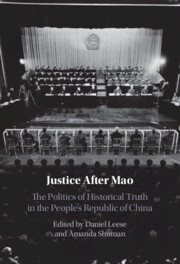53 results
Afterword
-
-
- Book:
- Justice After Mao
- Published online:
- 31 August 2023
- Print publication:
- 14 September 2023, pp 274-288
-
- Chapter
- Export citation
Figures
-
- Book:
- Justice After Mao
- Published online:
- 31 August 2023
- Print publication:
- 14 September 2023, pp vii-vii
-
- Chapter
- Export citation
Contributors
-
- Book:
- Justice After Mao
- Published online:
- 31 August 2023
- Print publication:
- 14 September 2023, pp ix-xi
-
- Chapter
- Export citation
Tables
-
- Book:
- Justice After Mao
- Published online:
- 31 August 2023
- Print publication:
- 14 September 2023, pp viii-viii
-
- Chapter
- Export citation
Part II - The Mechanics of Rehabilitation
-
- Book:
- Justice After Mao
- Published online:
- 31 August 2023
- Print publication:
- 14 September 2023, pp 97-144
-
- Chapter
- Export citation
Acknowledgments
-
- Book:
- Justice After Mao
- Published online:
- 31 August 2023
- Print publication:
- 14 September 2023, pp xii-xii
-
- Chapter
- Export citation
Introduction
-
-
- Book:
- Justice After Mao
- Published online:
- 31 August 2023
- Print publication:
- 14 September 2023, pp 1-20
-
- Chapter
- Export citation
Index
-
- Book:
- Justice After Mao
- Published online:
- 31 August 2023
- Print publication:
- 14 September 2023, pp 313-322
-
- Chapter
- Export citation
Part III - The Politics of Truth
-
- Book:
- Justice After Mao
- Published online:
- 31 August 2023
- Print publication:
- 14 September 2023, pp 145-190
-
- Chapter
- Export citation
Part I - Property
-
- Book:
- Justice After Mao
- Published online:
- 31 August 2023
- Print publication:
- 14 September 2023, pp 21-96
-
- Chapter
- Export citation
Bibliography
-
- Book:
- Justice After Mao
- Published online:
- 31 August 2023
- Print publication:
- 14 September 2023, pp 292-312
-
- Chapter
- Export citation
Part IV - Memory
-
- Book:
- Justice After Mao
- Published online:
- 31 August 2023
- Print publication:
- 14 September 2023, pp 191-273
-
- Chapter
- Export citation
Appendix
-
- Book:
- Justice After Mao
- Published online:
- 31 August 2023
- Print publication:
- 14 September 2023, pp 289-291
-
- Chapter
- Export citation
Copyright page
-
- Book:
- Justice After Mao
- Published online:
- 31 August 2023
- Print publication:
- 14 September 2023, pp iv-iv
-
- Chapter
- Export citation
Contents
-
- Book:
- Justice After Mao
- Published online:
- 31 August 2023
- Print publication:
- 14 September 2023, pp v-vi
-
- Chapter
- Export citation

Justice After Mao
- The Politics of Historical Truth in the People's Republic of China
-
- Published online:
- 31 August 2023
- Print publication:
- 14 September 2023
The Communist Judicial System in China, 1927–1976: Building on Fear Qiang Fang Amsterdam: Amsterdam University Press, 2021 336 pp. €115.00 ISBN 978-94-6372-945-1
-
- Journal:
- The China Quarterly / Volume 250 / June 2022
- Published online by Cambridge University Press:
- 10 June 2022, pp. 599-600
- Print publication:
- June 2022
-
- Article
- Export citation
The Rhetoric of Mao Zedong: Transforming China and Its People Xing Lu Columbia: University of South Carolina Press, 2017 272 pp. $49.99 ISBN 978-1-61117-752-7
-
- Journal:
- The China Quarterly / Volume 244 / December 2020
- Published online by Cambridge University Press:
- 18 December 2020, pp. 1169-1170
- Print publication:
- December 2020
-
- Article
- Export citation
Cryptic species and their utilization of indigenous and non-indigenous intermediate hosts in the acanthocephalan Polymorphus minutus sensu lato (Polymorphidae)
-
- Journal:
- Parasitology / Volume 145 / Issue 11 / September 2018
- Published online by Cambridge University Press:
- 19 February 2018, pp. 1421-1429
-
- Article
- Export citation
11 - Mao Zedong as a Historical Personality
- from Part I - Expansion and Conflict
-
-
- Book:
- The Cambridge History of Communism
- Published online:
- 28 September 2017
- Print publication:
- 21 September 2017, pp 269-290
-
- Chapter
- Export citation

